MAN engineers are now creating a climate-neutral four-stroke methanol retrofit for cruise ships and ferries
The maritime energy transition is taking another leap forward with the testing of a methanol dual-fuel four-stroke engine, designed to cut carbon emissions for ferries and cruise ships. Discover takes a look inside the factory hall where engineers are optimizing a retrofit solution for performance, emissions and sustainability.
By Moritz Gathmann
The factory hall at MAN Energy Solutions in the southern German city of Augsburg is one full of history: A memorial plaque reminds us that in this place, towards the end of the 19th century, the German engineer Rudolf Diesel constructed the engine that bears his name – and that still makes up the core technology keeping ships cruising around the world until today, be it passenger ferries or container ships.
Roughly 130 years later, in the very same hall, engineers are now working on climate-neutral ship engines – this time overhauling a seven cylinder four-stroke engine, as big as a medium-sized room, to make it fit for the future. “We’re meeting the maritime transport industry’s demands to retrofit our engines so that they can also be run with methanol,” says Matthias Auer, Head of Performance and Emissions at MAN Energy Solutions.
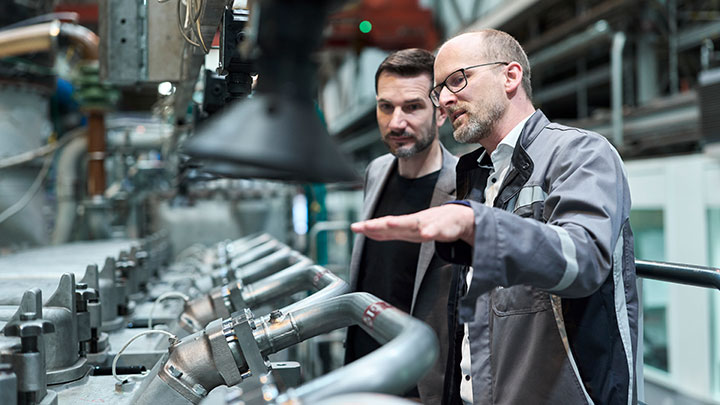
E-fuels propelling a climate-neutral future
The framework for the future of maritime transport is clear: In July 2023, the International Maritime Organization (IMO) adopted a strategy to reduce greenhouse gas emissions, and the aim is to reach climate neutrality in maritime transport by 2050. The solution is to gradually replace oil with climate-neutral energy sources such as green hydrogen, ammonia and methanol. “The shipowners are feeling the pressure to reduce their emissions,” says Bernd Siebert, Head of Retrofit and Upgrades at MAN Energy Solutions, “Otherwise they’ll be forced to buy CO2 certificates, pay fines or even decommission ships.
While methanol newbuilds and retrofits for MAN’s two-stroke dual-fuel engines for large container ships are already in full swing, the retrofit package for a methanol dual-fuel solution for their four-stroke engines (widely installed on passenger ferries and cruise ships) is set for release next year. In autumn 2025, MAN PrimeServ is planning to convert the first four-stroke engines for a pilot customer. From then, customers will be able to have their conventional MAN 48/60 engines converted to the status of a modern MAN 51/60R-DF-M engine, both with and without a common-rail system. That means that Auer and his team of 50 running the R&D test bench in Augsburg have around one year to find the best optimization of performance, efficiency and emissions.
We’re meeting the maritime transport industry’s demands to retrofit our engines so that they can also be run with methanol.
Right now they are testing the boost pressure, the emissions, the security system and the strength of the components under extreme conditions. Sensors have been installed around and inside the engine to collect data. “After the tests,” says Auer, “we’ll take apart the whole engine and each design engineer will inspect the component their in charge of. It’s true teamwork – and we’ve got a very experienced team here in Augsburg.
The key issue of the dual-fuel engine is the injection of the methanol. “We’re figuring out what’s the ideal dosage and which pressure should be applied,” says Auer. The clear aim is to maintain engine efficiency – no matter the fuel. Because the reality at this moment is that methanol, especially green methanol, is not widely available in ports around the world. But that is expected to change over the coming years.
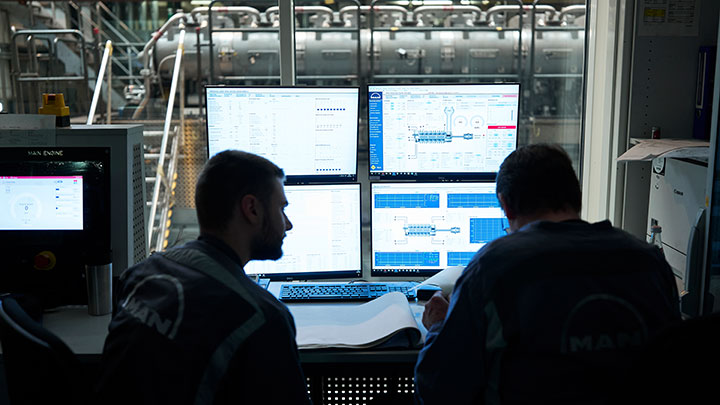
Methanol retrofit solutions
Auer and his colleagues are also simulating different environments. For example, by changing charge air temperature, they can figure out how the technology will react to extreme weather conditions in the Arctic or the Tropics. As always with testing, the devil is in the details: Recently, the engineers discovered that a sensor in the tank detected the nitrogen being used to insert the methanol tank – which gave the false impression that the tank was still full. The solution, simple enough, was to use a different sensor.
But for most customers, other issues are more important: “One of the first questions we get is if we have to cut open the ship to retrofit the engine,” says Siebert, who is in constant exchange with customers all over the world. “And the answer is: No.”
Shipowners are feeling the pressure to reduce their emissions.
Different from the installation of new engines that affords the cutting open of the ship and thus means long vessel downtimes, the retrofitting of engines can be done in a relatively short time in the dry dock. “Depending on the number of cylinders, the retrofitting takes four to eight weeks depending on the number of cylinder,” says Siebert. MAN Energy Solutions will release further methanol-powered dual-fuel four-stroke engine across the entire bore range. Based on engine type and application, the company will add both port fuel injection and high pressure direct injection solutions to its portfolio. For retrofit of legacy engines, the PFI technology has been identified as the clear favorite. Of the 2,000 MAN four-stroke engines viable for a methanol conversion and currently in operation worldwide, Siebert sees a retrofit potential for just under half. “We have decided to start with the retrofit solution first, because we see a huge emission saving potential in retrofitting the existing fleet already in the next years,” adds Siebert. “All these ships are already on sea and powered by fossil fuels. With the new retrofit option we can now upgrade them to climate-neutral operation and contribute to reaching IMO climate goals.”
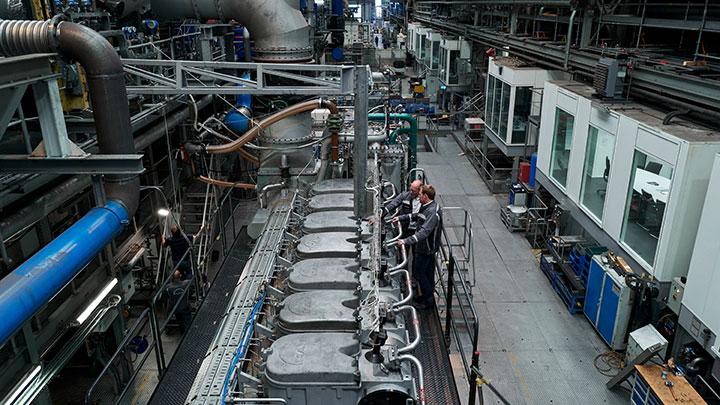
Shipyards ready to retrofit
MAN Energy Solutions is also cooperating closely with shipyards in advance to guarantee a smooth retrofit process. The modifications of the engine itself are good to handle: A new injector unit, a charge air line, an engine control system and a set of new sensors. In addtion, a new security system is needed for the safety requirements that come with methanol. Components such as the methanol fuel system are delivered as ready-built racks.
“In the process we’re not only retrofitting the engine, but also overhauling it,” says Siebert. “That means customers are basically getting an engine as good as new in the end.”
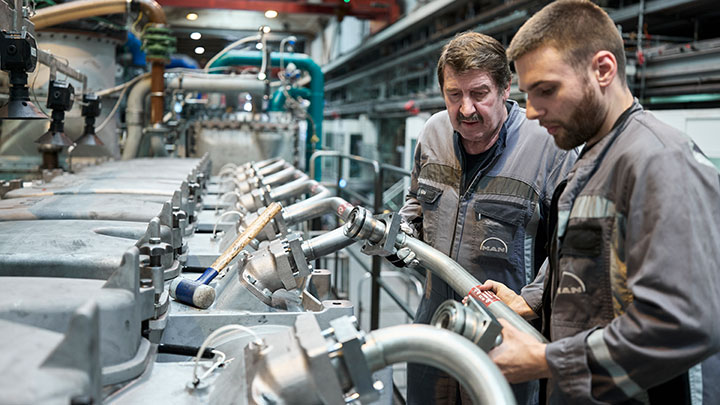
About the author
Berlin-based journalist Moritz Gathmann’s work has appeared in a number of media outlets, including Der Spiegel, the Frankfurter Allgemeine Sonntagszeitung and Zeit online.
MAN PrimeServ's dual fuel conversions
MAN PrimeServ constantly develops and provides retrofit products and solutions, allowing the existing fleet of vessels to meet new and future environmental legislations while enabling the vessels to operate on new alternative fuels like LNG, ammonia, and methanol.
Explore more topics
-

Hoegh - LNG-powered car carrier
With its first LNG-powered car carrier, Höegh Autoliners is taking a big step towards its target of net-zero by 2040. The centerpiece of the vessel is a MAN Energy Solutions MAN B&W ME-GI dual-fuel engine.
-
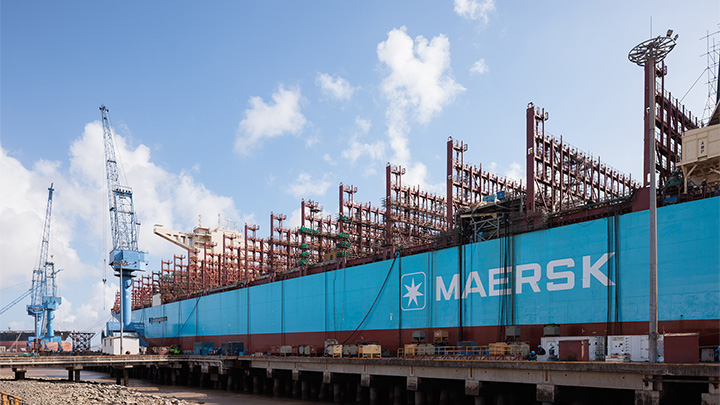
Maersk Halifax Retrofit
The world’s first methanol retrofit of the Very Large Container Vessel Maersk Halifax opens the doors for green fuels.
-

CMA CGM decarbonization strategy
Vice President of CMA SHIPS Xavier Leclercq on scaling-up alternative maritime shipping fuels to reach zero emission by 2050.
MAN Energy Solutions is now Everllence.
We have adopted a new brand name and moved to a new domain: www.everllence.com. This page will also be relocated there shortly. We are working on shifting all pages to www.everllence.com.
